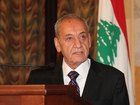Speaker Nabih Berri is hopeful that rival parliamentary blocs would find an alternative to the 1960 electoral law and the so-called Orthodox Gathering proposal by agreeing on a hybrid draft-law.
“Don't be afraid of the time factor. We still have three and a half months until the elections are held on June 9 and I believe there is enough time to agree on a new law if all the parties are willing to reach consensus,” officials, who visited Berri, quoted him as saying.
 Full Story
Full Story
Speaker Nabih Berri expressed hope on Saturday that the political foes will soon reach common ground over a hybrid electoral law that would serve as an alternative for the 1960 and the so-called Orthodox Gathering laws.
“We should create an alternative electoral law that gathers the proportional and winners-take-all systems to replace the 1960 and Orthodox laws,” Berri's visitors quoted him as saying.
 Full Story
Full Story
Head of the Mustaqbal bloc MP Fouad Saniora and Lebanese Forces chief Samir Geagea stressed on Wednesday the need to hold the parliamentary elections on time, announced the LF in a statement Thursday.
It said that the two officials agreed that the “best electoral law at the moment is a hybrid law” that combines the winner-takes-all and proportional representation systems.
 Full Story
Full Story
A hybrid draft-law that the March 14 opposition alliance and the Progressive Socialist Party have agreed on allows the elections to take place in 26 districts based on the winner-takes-all system and 9 governorates based on proportionality, sources said Thursday.
Informed political and al-Mustaqbal bloc sources told several newspapers that the hybrid formula will be announced within the coming days.
 Full Story
Full Story
Progressive Socialist Party leader MP Walid Jumblat said after meeting with Speaker Nabih Berri that “no elections will be held until consensus over an electoral law is reached”.
"Berri assured that no elections will take place if no agreement is reached,” Jumblat said after his talks with the speaker in Ain al-Tineh.
 Full Story
Full Story
March 8 coalition lawmakers considered on Tuesday the signing of the electoral decree a “black day” in the history of legislation, stressing that it will not be approved by the parliament.
“We reject the adoption of the 1960 law... It will not be approved” by the parliament, Change and Reform bloc MP Ibrahim Kanaan, who is loyal to Free Patriotic Movement leader MP Michel Aoun, told reporters gathered at the parliament.
 Full Story
Full Story
Speaker Nabih Berri criticized on Tuesday President Michel Suleiman and Prime Minister Najib Miqati after inking an electoral decree the day before, pointing out that he will not call for a parliamentary session if no consensus over the electoral law was reached.
Berri wondered how some officials declare that they oppose the 1960 law, which is based on yjr winner-takes-all system, then work according to it, hinting at Suleiman and Miqati.
 Full Story
Full Story
U.S. Ambassador Maura Connelly expressed concern on Monday over the security situation in Lebanon and along its border, stressing that the parliamentary elections should be held on time.
“I share the concern about the security situation within Lebanon and along its borders,” Connelly said after talks with Speaker Nabih Berri.
 Full Story
Full Story
Speaker Nabih Berri hinted on Monday that the parliamentary elections set to be held on June 9 will be postponed as he warned that security and not the polls were a priority.
“Just take a look at the very worrying security situation,” Berri told several local newspapers.
 Full Story
Full Story
Speaker Nabih Berri has questioned media reports that he will call parliament to session on March 9 in order to vote on a parliamentary electoral law, reported the daily An Nahar on Sunday.
He told the daily that claims that a session will be held on March 9 are media speculation.
 Full Story
Full Story



